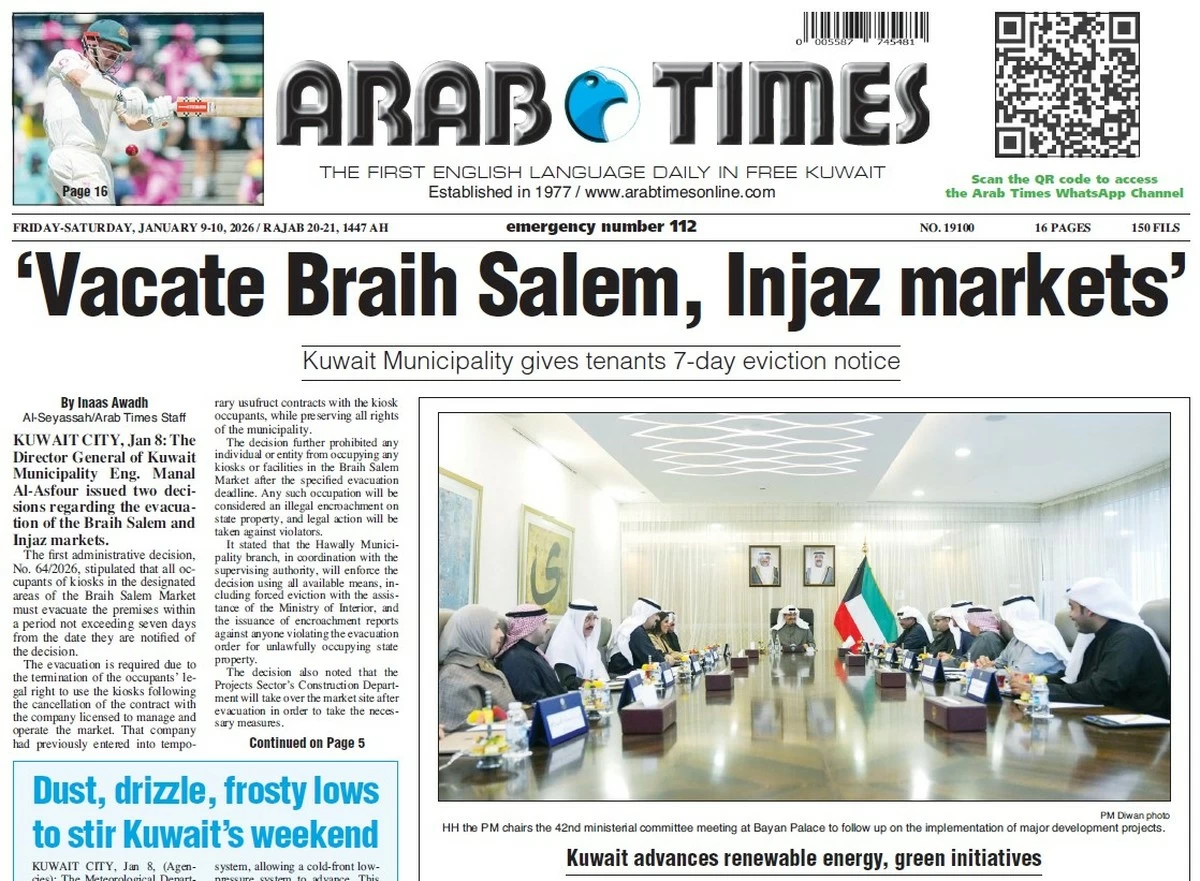03/08/2024
03/08/2024
TODAY, we remember the Iraqi invasion of Kuwait and the tragic stories that will forever remain in the memory of its citizens. On the other hand, we must acknowledge that the strength, decisiveness, and hard work demonstrated by Kuwaiti citizens during the crisis serve as a valuable lesson for political and social figures, as well as for the entire society.

During that challenging period, Kuwaiti people worked tirelessly in all fields, each contributing to the nation’s resilience. Along with the heroes who took part in military actions, many others resisted in their own ways, including bakers, car repair workers, laundry staff, poultry workers, and many other citizens who were running essential businesses.
Unfortunately, this experience was not used as a guideline. Furthermore, public institutions and successive governments have increasingly relied on foreigners for all types of jobs. This is a violation of Article 26 of the Constitution, which prohibits assigning public sector positions to non-Kuwaiti employees. On the other hand, the government has linked recruitment to academic qualifications for several years, ignoring the fact that nearly 90 percent of public sector employees are in positions that are not related to their specializations.
Also, the majority of them occupy administrative roles. It is perplexing that a Kuwaiti population of just 1.5 million needs three million expatriates to serve them. This situation highlights an obvious image of dependency and places a huge burden on the public budget at all levels. Recently, it was found that a large number of Kuwaiti workers were appointed through “wasta” or quota considerations.
Additionally, many of these workers would refrain from going to their offices. This was revealed after the implementation of the fingerprint attendance system, which exposed significant administrative and executive shortcomings as well as major failures in the employment system. At the same time, public institutions lack skilled national workers, which poses a risk if a regional conflict arises. In such a scenario, expatriates might leave, leaving us without essential personnel such as nurses and technicians to operate power plants and other public facilities, as many citizens are only familiar with easier jobs.
Recently, a public hospital posted an advertisement for hiring almost 1,000 non-Kuwaiti nurses to cover three shifts. If the total number of workers at the Ministry of Health is 67,000, only ten percent are Kuwaiti. If the non-Kuwaiti workers were to leave, it would critically undermine the health system. To solve this issue, the link between employment and academic qualifications should be suspended. Citizens seeking jobs need to be trained in essential technical skills, similar to the approach taken by many countries, including those in the Gulf region.
These countries implemented training programs to qualify nationals for technical roles, regardless of the policy’s cost. As a result, nationals have taken on technical positions with higher salaries than their highly qualified counterparts. Kuwait needs national workers to operate power plants and serve as medical laboratory technicians in place of expatriates. The shortage of assistant medical staff during the COVID-19 crisis highlighted the critical need for a reliable national workforce. Hiring non-Kuwaiti employees places a heavy financial burden on the State Treasury.
Expatriate workers require housing, transportation, and various other services that are costly for the state. Employing nationals would alleviate this burden and reduce expenses. Additionally, housing provided to expatriate workers could be allocated to nationals, which will solve multiple issues simultaneously. These problems are well-known to the executive decision-makers and ministers.
To the decision-makers, I would like to emphasize that the current regional and global situations are exceptionally sensitive. It is time to discard outdated theories and misconceptions that have caused a lot of damage and hindered reform, such as the notions that “Kuwaitis are not hardworking” or “these types of jobs are not suited for Kuwaiti citizens.”
I dare to ask: Was it not the fathers of the current Kuwaiti youth who undertook such demanding jobs during the Iraqi invasion? Hasn’t it been recently proven through youth campaigns that young Kuwaiti men and women are fully capable of shouldering responsibility? Consider a scenario where a war or disaster occurs. Who will manage the oil institutions and other public service facilities, especially if expatriates leave Kuwait? Is Kuwait truly in need of such a large number of employees in the public sector, particularly those who only focus on clocking in and out while spending their duty hours in cafes? Many of these employees lack specific job responsibilities, resulting in underemployment that is costly and unproductive. Reflect on the lessons learned during the challenging seven-month period to build a capable and resilient state.
By Ahmed Al-Jarallah
Editor-in-Chief, the Arab Times
[email protected]


